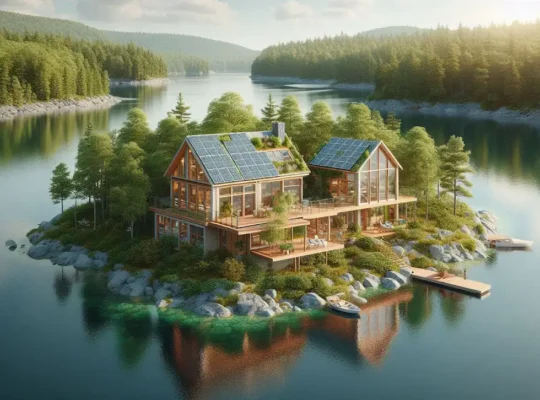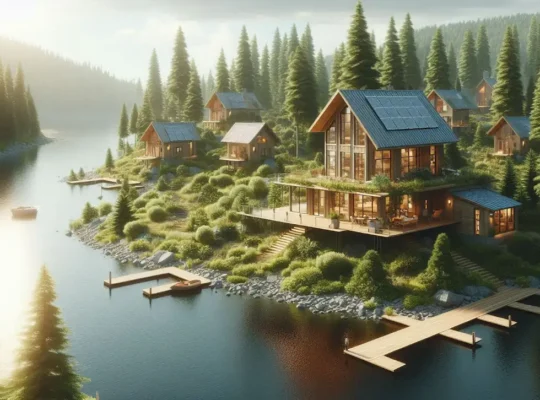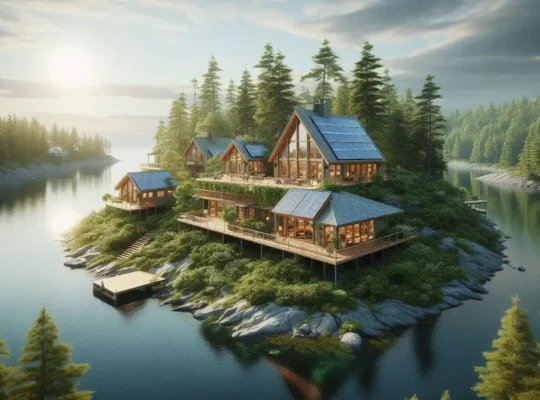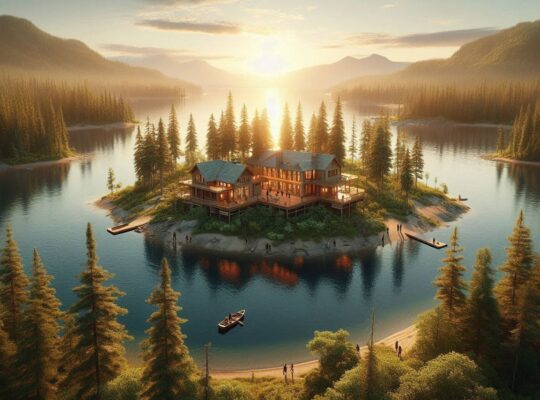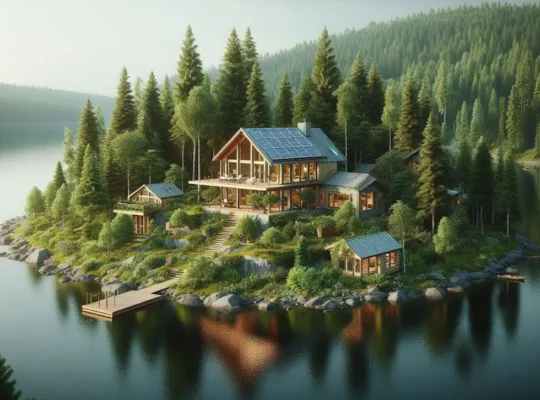Pioneering Desert Autonomy: The Off-Grid Revolution
The United Arab Emirates has emerged as an unexpected leader in off-grid property development, challenging conventional notions of desert living with innovative sustainable solutions. Recent statistics reveal a remarkable 65% increase in off-grid property developments across the UAE since 2023, with particular concentration in areas surrounding Dubai and Abu Dhabi. These pioneering projects combine traditional desert wisdom with cutting-edge technology, creating self-sufficient habitats that operate independently from municipal utilities while maintaining luxury standards.
The economic implications of off-grid living in the UAE have proven surprisingly favorable, with initial investment costs offset by long-term operational savings. Analysis shows that fully off-grid properties achieve complete return on investment within 7-9 years, with ongoing utility savings averaging AED 75,000 annually. This financial efficiency has attracted significant investor interest, with property values for off-grid developments appreciating 25-30% faster than conventional luxury properties in comparable locations.
The integration of traditional Arabic architectural principles with modern sustainable technologies has created a unique approach to off-grid living. Contemporary implementations of wind towers (barajeel) and courtyard designs, enhanced with smart technology and advanced materials, demonstrate superior performance in natural cooling and ventilation. These hybrid systems reduce cooling energy requirements by up to 70% compared to conventional desert properties while maintaining indoor temperatures below 24°C throughout summer months.
The development of off-grid communities has fostered the emergence of innovative resource-sharing networks. Microgrids connecting multiple properties enable efficient energy distribution and storage, while community-scale water treatment systems optimize resource utilization. These collaborative approaches have reduced individual property infrastructure costs by approximately 35% while enhancing system reliability and resilience.
Autonomous Energy Systems: Beyond Solar Integration
The evolution of energy independence in UAE off-grid properties extends far beyond traditional solar installations, incorporating diverse renewable sources and advanced storage solutions. Hybrid energy systems combining solar, wind, and hydrogen fuel cells provide reliable power generation across varying weather conditions. These integrated systems demonstrate 99.9% reliability while producing excess energy during peak generation periods, which can be stored or converted to hydrogen for later use.
Recent innovations in energy storage technology have revolutionized off-grid living capabilities. Advanced lithium-iron-phosphate battery systems, coupled with hydrogen storage, provide up to 120 hours of autonomous operation during suboptimal generation conditions. The implementation of artificial intelligence in energy management systems optimizes resource allocation, predicting consumption patterns and adjusting generation strategies accordingly. These smart systems have improved overall energy efficiency by 40% compared to traditional off-grid solutions.
The development of building-integrated photovoltaics (BIPV) has transformed architectural possibilities in off-grid properties. Transparent solar cells incorporated into windows and façade elements generate approximately 25% of total energy requirements while maintaining aesthetic appeal. The integration of solar thermal systems for water heating and cooling further reduces energy demand, with absorption chillers providing efficient air conditioning using thermal energy directly.
Innovative approaches to energy conservation complement generation systems in off-grid properties. Phase-change materials integrated into building structures provide passive temperature regulation, while advanced insulation technologies reduce thermal transfer by up to 85% compared to conventional construction. These passive systems significantly reduce energy requirements for climate control, enhancing the viability of off-grid living in extreme desert conditions.
Water Independence: Sustainable Hydration Solutions
Water autonomy represents a critical challenge in UAE off-grid properties, driving the development of innovative solutions for water generation and conservation. Atmospheric water generators, powered by renewable energy, produce up to 500 liters of potable water daily from air moisture, despite the arid climate. These systems incorporate advanced filtration and mineralization processes, ensuring water quality exceeds international standards while maintaining complete independence from municipal supplies.
The implementation of closed-loop water management systems maximizes resource efficiency in off-grid properties. Advanced filtration and purification technologies enable water recycling for non-potable uses, reducing fresh water requirements by up to 75%. Blackwater treatment systems convert waste into irrigation resources, while constructed wetlands provide natural filtration and create valuable ecosystem services. These integrated approaches demonstrate remarkable efficiency, with water consumption reduced to approximately 50 liters per person daily, compared to the UAE average of 550 liters.
Smart water management systems play a crucial role in maintaining water independence. AI-powered monitoring systems track usage patterns and detect potential leaks, while predictive analytics optimize distribution and storage. The integration of smart meters and automated controls enables real-time adjustment of water systems, reducing waste and ensuring optimal resource allocation. These technologies have improved water use efficiency by 60% compared to conventional properties.
Innovation in landscape design complements water conservation efforts in off-grid properties. Xeriscaping principles, combined with smart irrigation systems, create beautiful desert gardens while minimizing water requirements. The selection of native and drought-resistant species, coupled with moisture-retaining soil amendments, reduces irrigation needs by up to 80% compared to traditional landscaping approaches. These water-wise gardens contribute to property cooling while supporting local biodiversity.
Waste Management: Circular Economy in Practice
The implementation of closed-loop waste management systems in UAE off-grid properties demonstrates practical applications of circular economy principles. Organic waste processing through advanced composting and anaerobic digestion systems produces nutrient-rich soil amendments and biogas for energy generation. These systems process up to 95% of organic waste on-site, eliminating the need for municipal collection while creating valuable resources for landscape maintenance.
Innovation in construction waste management begins during property development, with careful material selection and modular design approaches reducing waste generation by up to 70% compared to traditional construction methods. The use of recycled and recyclable materials creates opportunities for future material recovery, while advanced sorting systems ensure maximum resource recovery from operational waste streams. These practices have reduced construction costs by approximately 15% while minimizing environmental impact.
The development of community-scale recycling infrastructure supports effective materials management in off-grid properties. Advanced sorting systems and processing equipment enable on-site recycling of plastics, glass, and metals, reducing transportation requirements and creating opportunities for local material reuse. The implementation of reverse logistics systems ensures efficient handling of materials that cannot be processed on-site, maintaining zero-waste objectives while optimizing resource recovery.
Smart waste management systems integrate with property management platforms, providing real-time monitoring of waste generation and processing activities. AI-powered analytics identify opportunities for waste reduction and optimize processing operations, while automated collection systems enhance convenience for residents. These integrated approaches have demonstrated 85% waste diversion rates while reducing management costs by approximately 40% compared to conventional waste handling methods.
Smart Infrastructure: The Digital Backbone
The integration of advanced digital technologies creates the foundation for successful off-grid living in UAE properties. Artificial intelligence and machine learning systems optimize resource allocation across all property systems, from energy management to water distribution. These smart systems demonstrate remarkable efficiency improvements, reducing overall resource consumption by up to 45% compared to manually managed properties while enhancing resident comfort and convenience.
Edge computing and mesh networks ensure reliable system operation without dependence on external connectivity. Distributed sensors and control systems create resilient infrastructure capable of autonomous operation under varying conditions. The implementation of blockchain technology enables secure resource trading between properties, creating efficient marketplaces for excess energy and water resources. These digital systems have improved overall system reliability by 35% while reducing operational costs.
Advanced monitoring and predictive maintenance systems ensure optimal performance of off-grid infrastructure. Digital twins simulate system operation under varying conditions, enabling proactive optimization and risk management. The integration of augmented reality interfaces simplifies maintenance procedures while reducing response times for technical issues. These technologies have extended equipment lifespan by approximately 40% while reducing maintenance costs by 25%.
Mobile applications provide residents with comprehensive control over property systems while delivering detailed insights into resource consumption and generation. Gamification elements encourage sustainable behaviors, while social features enable community engagement and resource sharing. These digital interfaces have improved resident satisfaction by 55% while supporting optimal system performance through informed decision-making.
Resilient Design: Adapting to Environmental Challenges
The design of UAE off-grid properties incorporates sophisticated approaches to environmental resilience, ensuring reliable operation under extreme conditions. Advanced weather monitoring systems integrate with property management platforms, enabling automated responses to changing environmental conditions. These adaptive systems maintain optimal indoor environments while protecting infrastructure from sandstorms, extreme temperatures, and occasional heavy rainfall events.
Innovative building envelope designs combine traditional architectural wisdom with modern materials science. Dynamic façade elements adjust to solar conditions, while advanced insulation systems maintain stable indoor temperatures with minimal energy input. The integration of self-cleaning surfaces and dust mitigation systems reduces maintenance requirements while maintaining system efficiency. These design elements have improved building performance by 50% compared to conventional desert architecture.
The development of resilient landscaping strategies creates protective barriers while supporting biodiversity. Strategic placement of vegetation and hardscape elements reduces wind exposure and sand accumulation, while supporting natural cooling through evapotranspiration. The implementation of climate-adapted species and smart irrigation systems ensures landscape survival under extreme conditions while minimizing resource requirements. These approaches have reduced maintenance costs by 45% while enhancing property values.
Research indicates that resilient design features in off-grid properties deliver significant long-term benefits, with insurance costs reduced by approximately 30% compared to conventional properties. The integration of robust materials and redundant systems ensures reliable operation under varying conditions, while smart monitoring enables proactive maintenance and risk management. These design approaches have established new standards for sustainable desert living while demonstrating remarkable return on investment.

